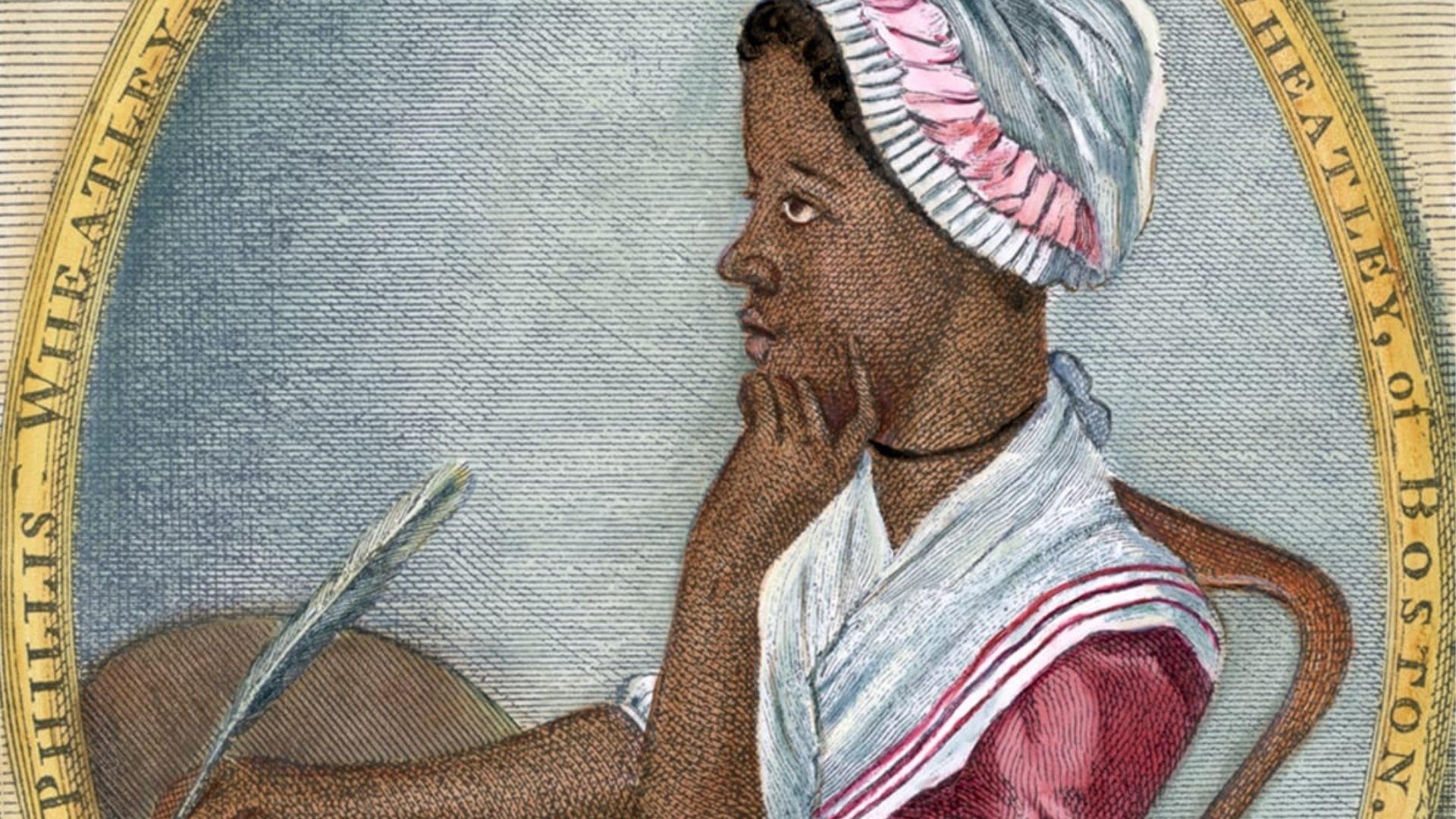On Imagination Poem by Phillis Wheatley
On Imagination
THY various works, imperial queen, we see,
How bright their forms! how deck'd with pomp
by thee!
Thy wond'rous acts in beauteous order stand,
And all attest how potent is thine hand.
From Helicon's refulgent heights attend,
Ye sacred choir, and my attempts befriend:
To tell her glories with a faithful tongue,
Ye blooming graces, triumph in my song.
Now here, now there, the roving Fancy flies,
Till some lov'd object strikes her wand'ring eyes,
Whose silken fetters all the senses bind,
And soft captivity involves the mind.
Imagination! who can sing thy force?
Or who describe the swiftness of thy course?
Soaring through air to find the bright abode,
Th' empyreal palace of the thund'ring God,
We on thy pinions can surpass the wind,
And leave the rolling universe behind:
From star to star the mental optics rove,
Measure the skies, and range the realms above.
There in one view we grasp the mighty whole,
Or with new worlds amaze th' unbounded soul.
Though Winter frowns to Fancy's raptur'd eyes
The fields may flourish, and gay scenes arise;
The frozen deeps may break their iron bands,
And bid their waters murmur o'er the sands.
Fair Flora may resume her fragrant reign,
And with her flow'ry riches deck the plain;
Sylvanus may diffuse his honours round,
And all the forest may with leaves be crown'd:
Show'rs may descend, and dews their gems disclose,
And nectar sparkle on the blooming rose.
Such is thy pow'r, nor are thine orders vain,
O thou the leader of the mental train:
In full perfection all thy works are wrought,
And thine the sceptre o'er the realms of thought.
Before thy throne the subject-passions bow,
Of subject-passions sov'reign ruler thou;
At thy command joy rushes on the heart,
And through the glowing veins the spirits dart.
Fancy might now her silken pinions try
To rise from earth, and sweep th' expanse on high:
From Tithon's bed now might Aurora rise,
Her cheeks all glowing with celestial dies,
While a pure stream of light o'erflows the skies.
The monarch of the day I might behold,
And all the mountains tipt with radiant gold,
But I reluctant leave the pleasing views,
Which Fancy dresses to delight the Muse;
Winter austere forbids me to aspire,
And northern tempests damp the rising fire;
They chill the tides of Fancy's flowing sea,
Cease then, my song, cease the unequal lay.
The poem, On Imagination by Phillis Wheatley, is testament to the patronage and support of the ‘Wheatley family of Boston, who taught her to read and write, and helped encourage her poetry.’ A higher education is evident in every line. Phillis displays knowledge of subjects including philosophy, biology ‘Fair Flora’, astronomy ‘the rolling universe behind: From star to star the mental optics rove, Measure the skies, ’ and especially classical literature. ‘From Helicon's refulgent heights attend’ begins the plea to ‘Ye sacred choir, and my attempts befriend: To tell her glories with a faithful tongue’; is Phillis proclaiming her ardent desire to get her facts and the song of her poem right. ‘Sylvanus’ ‘in Roman religion (was) an ancient pastoral deity, protector of uncultivated lands.’ This is exactly the context within which Phillis references him. The names ‘Tithon’ and ‘Aurora’ are also pure classical imagery and probably also alludes to Tennyson’s poem ‘Tithon’. To quote directly from 'Literature is the source of Human real trace' in an attempt to prove Phillis Wheatley’s exact meaning. ‘Tithonus is based on a classical fable. Aurora, the goddess of Dawn, fell in love with a handsome youth, Tithonus by name. At the request of the goddess, Zeus allowed the gift of immortality on Tithonus. The goddess, however, forgot to ask for the perpetuation of her lover’s youth and beauty. With the passage of time Tithonus grew frightfully old and enfeebled, so much so that his goddess take back her gift and let him die, but Aurora was helpless, as even, “gods themselves can not recall their gifts” Tithonus is immortal but as he is rapidly growing old he laments over his fate. All other objects ripen, decay and fall. But he is to hover for ever like a shadow over the Eastern Horizen in the hands of his ‘lover’ Aurora. Wheatley wrote ‘From Tithon's bed now might Aurora rise, Her cheeks all glowing with celestial dies, ' seems to mean exactly what the fable states, the shadow of Tithonus’ within the dawn of Aurora at the start of each day. Wheatley has written an exceptionally beautiful and complexly detailed poem.
What an, inner journe meticulously exploring every corner, of ourselves, and our role, in the universe space
These poems are so nice. They remind me of the colonial times and these poems are from the colonial times. I like things like this stuff!
This poem has not been translated into any other language yet.
I would like to translate this poem
Some think this poem 'On Imagination' has an underlying meaning concerning the abilities of slaves to learn and excel in creative subjects just as well as the white race. Maybe so. It certainly can be read in that vein. Like Imagination! Who can sing thy force? could be asking who cannot be inspired to create? There is a force in this poem called Winter that discourages imagination. Winter could be seen as the white man who rips the ability to read out of black hands as well as the ability to write which pretty much freezes imagination to the ephemeral oral transmission of thoughts. .